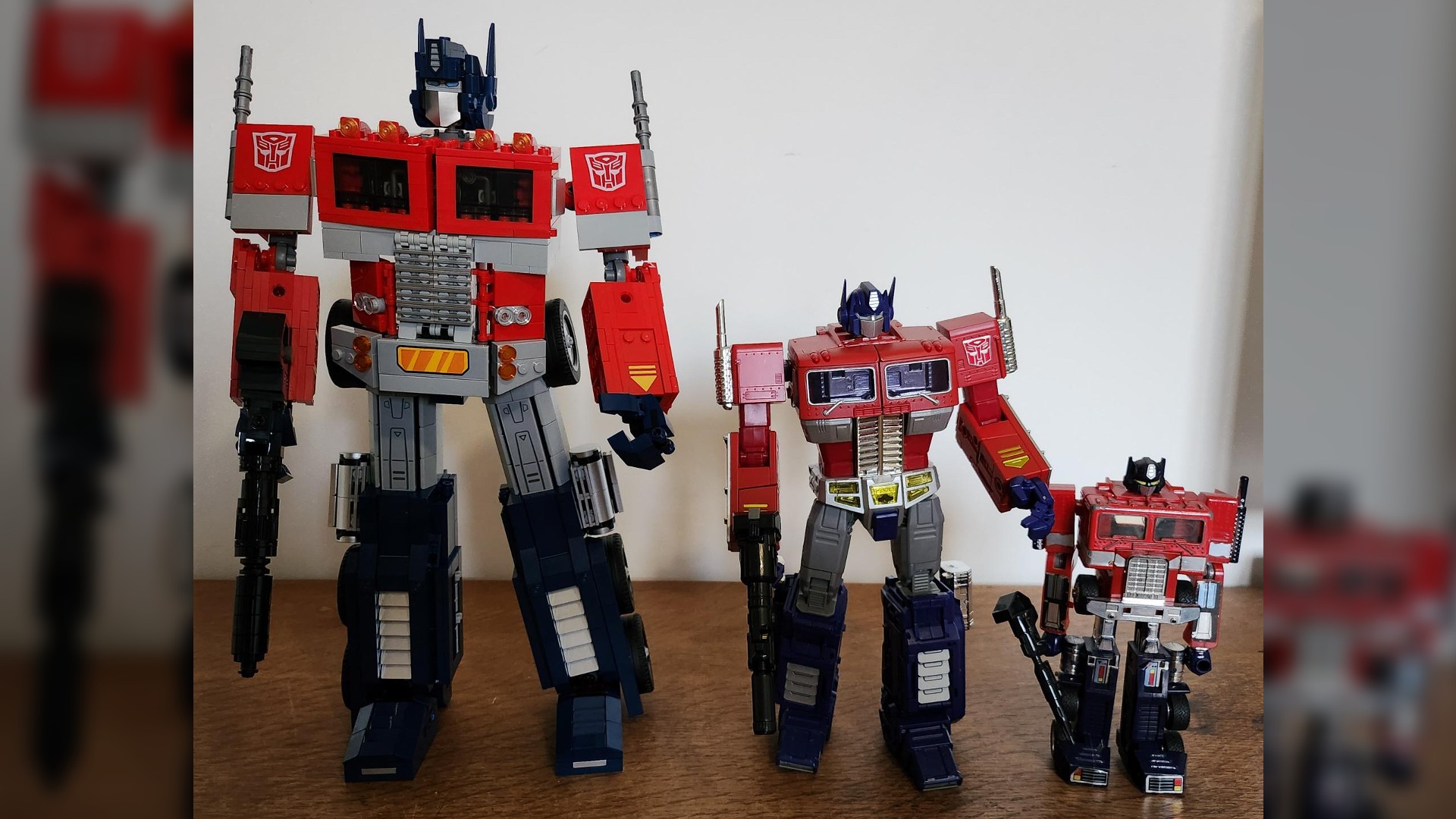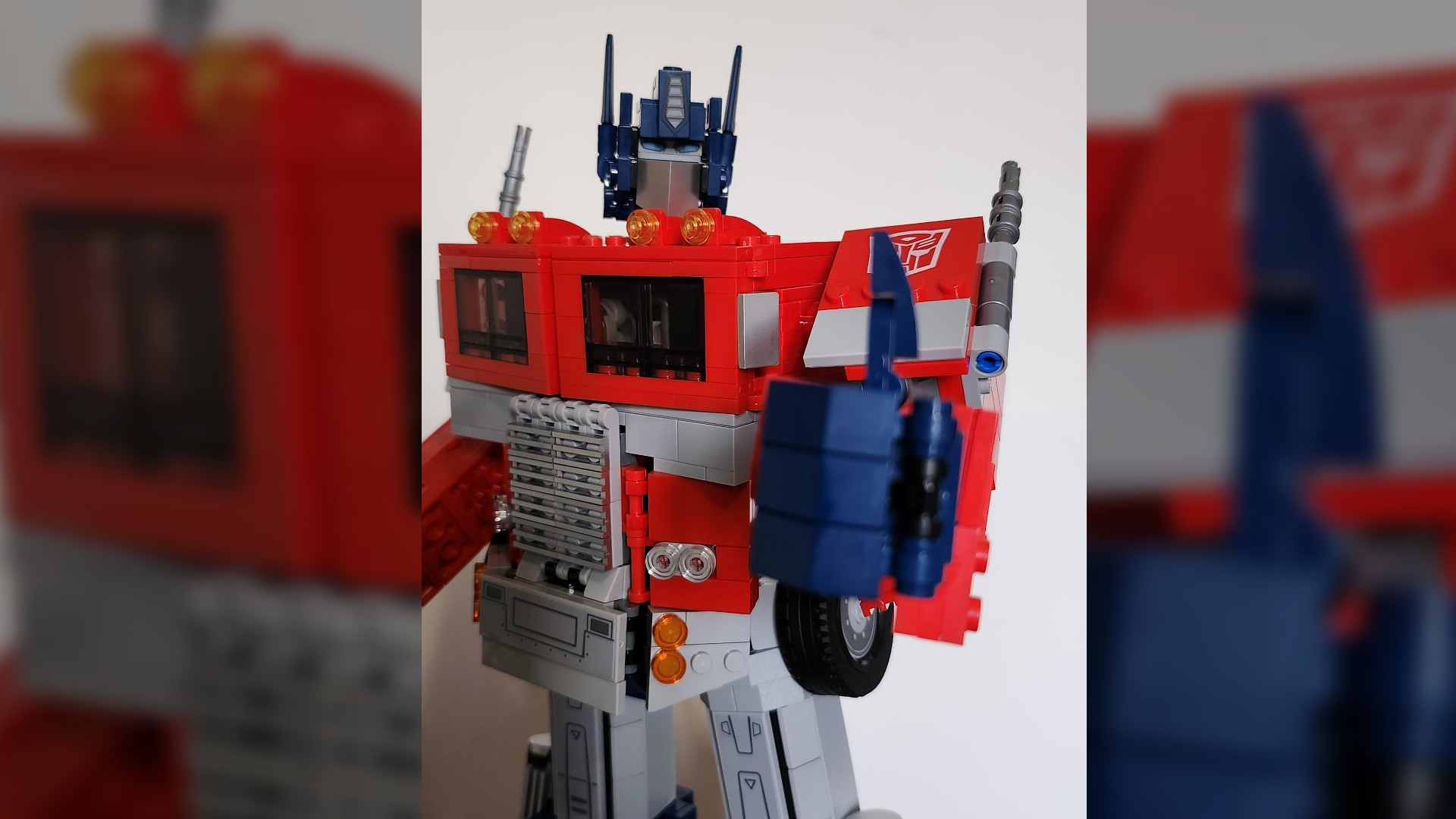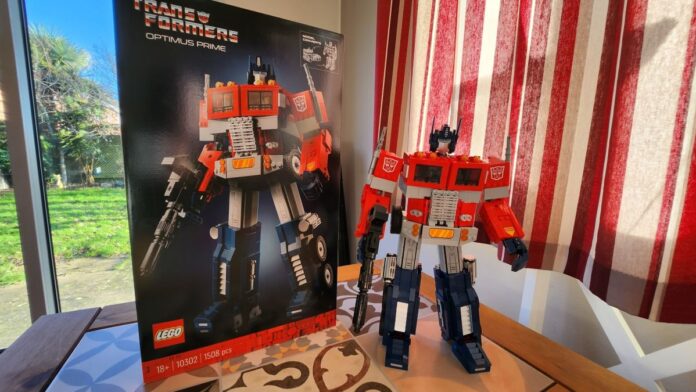Essential info:
Price: $179.99/£159.99
Model number: 10302
Pieces: 1,508
Finished dimensions (robot mode): 13.5 x 5 x 11 inches (35 x 12 x 27 cm)
Finished dimensions (truck mode): 5.5 x 10.5 x 4.5 inches (15 x 27 x 12 cm)
Recommended age: 18+
It’s been one of the biggest eyebrow-raisers of recent years in the toy industry – rivals the Lego Group and Hasbro teaming up to produce the first official Lego Transformer, and who else could this Cybertronian in brick form be but the valiant leader of the Autobots, Optimus Prime?
Just in case you’ve lived under a rock for the past 38 years, the story of The Transformers involves a species of sentient robots from the planet Cybertron who have the ability to transform from robot mode into vehicles, devices, and even mechanized animals. The two factions of Transformers, the heroic Autobots and the evil Decepticons, are at war, and that war spreads across the stars from Cybertron to Earth (and eventually to other worlds such as Nebulos, but that’s another story).
The toys were originally produced by Japanese company Takara in the late 1970s and early 1980s, in the guise of various lines such as Diaclone and Microchange, before Hasbro bought the toys and relaunched them as The Transformers. Takara (now merged with Tomy) still make Transformer toys alongside Hasbro, which is why the Takara Tomy logo is on the Lego Optimus Prime box alongside Hasbro’s logo.
There’s a skill to designing Transformers, since they’re really two toys in one, so who better to design Lego’s Optimus Prime than Lego Senior Designer Joseph Patrick Kyde, who previously worked for Hasbro on their various Transformers’ lines. Have his efforts been worth it? Is this one of the best Lego space sets that you can buy? Let’s find out.
Lego Icons Optimus Prime: Build
Before we even get stuck into the build, we just want to mention the box, which is a stylish affair showing Optimus in robot mode against a dark background – we think it’s sure to look attractive on the toy shelves. The opening flaps are on the bottom of the box, so if you’re a collector who likes to display packaging, you can stand the box up on the opened flaps and display it intact.
Out of the box come tumbling 12 bags, numbered 1 to 10, with two numbered 5 and one bag, containing the rubber tires, not numbered at all. The build is straight forward but not exciting, mostly bricks on top of bricks, with no really clever building techniques and what is now almost a standard SNOT (studs not on top) finish.
Sometimes with these big builds you can spend some time building the core interior structure before it becomes apparent what you are indeed building, so we were pleased to find that from the very beginning. With bag 1 it was evident that we were constructing Optimus’ iconic chest formed from his truck windscreen, which is on hinges to allow us to open it up and place the Creation Matrix inside. Slanted bricks prevent the windscreen from shutting flat, thereby creating an angled chest.
Bag 2 gives the first indication of moving pieces that will come into play later to allow transformation – a swiveling neck block and a rotating waist held in place by Technic pins and rods.
With bags 3, 4, 5, and 6 we build the legs and feet, and we found it pleasing how quickly construction was coming along. The legs are chunky and sturdy, with very satisfying ratchet joints. There’s some neat chromed bricks for building the fuel tanks, which the instructions point out is to mimic the chromed silver of the original toy. However, our heart sank when we saw there was a sticker sheet. Stickers can be notorious for being fiddly to apply, and some of the stickers go on Optimus’ thighs.
We would have preferred printed pieces here, but there are some nifty red plates with printed Autobot insignia (‘Autobrands’) and yellow arrows that go on Optimus’ arms, and a few printed pieces that are part of his head build. These include his eyes, which are, unusually, printed on the thin side of a 2 x 1 plate.
With Optimus Prime fully constructed by the end of bag 8, the final two bags contain the pieces for his energon axe (which Prime used to fight Megatron on top of Sherman Dam in the second episode of the 1980s cartoon series, More Than Meets the Eye Part 2), and his iconic ion rifle, which is basically built be skewering various black cylindrical bricks onto a Technic rod, with the exception of one clever use of a blacked-out window canopy to create the shape of the rear of the rifle.
The set is finished off with a single energon cube that seems rather extraneous but includes some lovely pinky-purple plates, and the jetpack that Optimus borrowed from Sideswipe in an attempt to pursue the escaping Decepticons in More Than Meets the Eye Part 3 (he ultimately fails in his pursuit, but Mirage uses his invisibility powers to sneak on board the Decepticon’s spaceship and save the day).
Lego Icons Optimus Prime: Design

The finished robot is big, standing 13.5 inches (35 cm) tall and towers over his original 1984 incarnation. We think it really looks the part, but here is where we have to remember that this is a construction model and not an action figure. Posing Optimus Prime is limited because he has no knee joints, presumably for stability reasons – he is heavy, and Lego don’t have any plausible connections in their inventory that could act as knee joints and carry Optimus’ weight for long without sagging. He does have ankle rockers, which helps somewhat with posing.
His upper body has more articulation – a 360-degree waist swivel, 360-degree shoulder joints, a 90-degree hinge at the elbow, wrist swivels, a neck swivel, and a neck joint that allows him to look up, though this is part of the transformation and isn’t particularly aesthetically pleasing. The hinged radiator grill and flaps containing the headlamps create a tapered midriff, avoiding the design becoming blocky.
Another widely discussed design feature is Optimus’ head – it has the correct silhouette and all the right features except that it has no nose, which makes his face look a little odd. However, if you search online you will find mods that rebuild Optimus’ head to give him a nose.
From the rear, Optimus Prime is a bit of a mess, though this is mitigated somewhat by putting the jetpack on Optimus, which hides some of the unsightly parts. The addition of the jetpack does, however, make him a little back-heavy.
Optimus’ ion rifle attaches to the studs on his arm, allowing his hands to loosely clasp the handle without the gun dropping from them. To wield his energon axe, his hand can swivel out of the way, revealing a hole into which the axe’s Technic rod connection can be inserted (this makes it look like the axe itself is emanating from the end of his arm, just like in the cartoon). However, the axe is too heavy for his arm to hold aloft, causing his arm to sag, so Optimus can’t really be posed with it raised above his head.
What really hammers home the fact that this is not an action figure, but rather a model to be displayed, is that sections of it have a tendency to fall apart when moved. But, all of these issues fall by the wayside when you consider the remarkable fact that Lego Optimus Prime transforms! And we don’t mean that you can dissemble the robot and rebuild the bricks into a truck. He literally – by the invocation of swivels, hinges, twists, and turns – transforms into a truck, and the transformation is pleasingly more involved than we thought it would be.
First, clip the legs together, and then lift up the arms and the hinged grill so that you have clearance to rotate the torso by 180 degrees. Fold his legs at the hips by 90 degrees, twist his fuel tanks and fold his feet down to form the base of the truck, and then flip Optimus’ head into the body of the truck. His shoulders swing back, his forearms go beneath his truck cab, and by twisting his fists out of the way you can push the grill flat against the truck cab, and hey presto, he’s in truck mode!
We were delighted by this truck mode – compact, chunky, and rolls well so that you can drive it across the carpet. Be careful when transforming however, as we found that his fists and head have a habit of falling off.
The transformation more than makes up for any deficiencies in robot mode, and we might actually display him in truck mode more than we do in robot mode.
Should you buy the Lego Icons Optimus Prime?

If you’re a Transformers fan, then the answer is obviously yes. If you’re just a fan of toys in general, then the historic nature of this team-up between Lego and Hasbro is also a powerful reason to purchase Lego Optimus Prime. If you’re just a Lego fan with no connection to The Transformers, then it’s a more difficult question to answer, but the fact that Optimus’ engineering allows it to transform so smoothly is an innovative feature that no other Lego set provides, at least certainly not in such a polished fashion.
It should be noted that Optimus Prime does not come with his trailer or his vehicle drone, Roller, but including these would possibly double or triple the price, so we understand why they’ve not been deemed necessary.
As it is, we do feel that at $179.99/£159.99 (opens in new tab), Lego Optimus Prime is a little overpriced for what you get, and you might be best waiting for discounts and sales before adding this Autobot to your Lego collection.
What other Lego kits can you buy?
This is the first official Lego Transformer, but as part of the Lego Icons line, there are other associated sets that could also appeal to customers who buy Optimus Prime. These include the Lego Icons Galaxy Explorer ($99.99/£89.99 (opens in new tab)) and the Lego NASA Space Shuttle Discovery ($199.99/£169.99 (opens in new tab)).
Of if you just love all things space then the best Lego space sets and best Lego Star Wars sets will definitely have something for you – we’re big fans of the Lego Guardians of the Galaxy Ship and Lego Star Wars R2-D2 sets.


